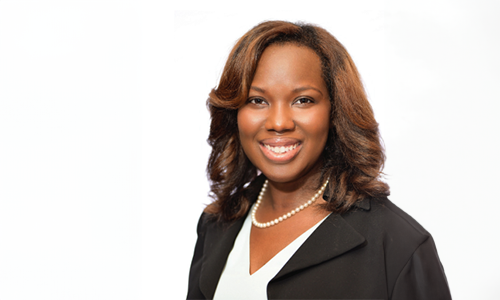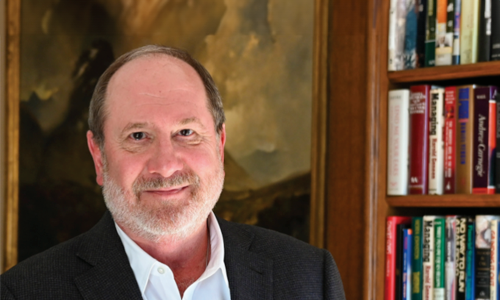Toyota executive says people are the engine of the company
The Toyota plant in Blue Springs, MS, makes the Corolla sedan, the world’s best-selling
car. Toyota Mississippi President Sean Suggs, a 2010 Harbert EMBA graduate, talks
about the college and about leading a 1,700-acre manufacturing facility with more
than 2,700 employees that produces a Corolla every 75 seconds.
Harbert Magazine: Please tell us about your responsibilities as president of Toyota Mississippi.
Sean Suggs: As president/head coach—that’s what I like to call myself—I’m responsible for some
of the greatest team members in the world here at Toyota Mississippi. I lead the entire
plant operations from the stamp panel through the welding process, the painting process,
the quality assurance and the assembly process in our plant. Also, the plant logistics.
And on the administration side, accounting and finance, facilities, safety, environmental,
general affairs. So there’s a multitude of different things that we have here that
I lead and support, even information technology. We have all of those operations here
on site.
HM: How did your business education at Auburn prepare you for these high-level responsibilities?
Sean Suggs: The curriculum at Auburn was fantastic for me. It gave me an opportunity to experience
the global marketplace and organizational leadership. Some of the cost management
classes were outstanding, quantitative decision-making classes, all of those things,
just to name a few, helped not only with the job that I had when I was going to school
there, but also prepared me, I believe, for future opportunities. Auburn does a really
good job with the curriculum to not only talk about the technical aspects of the classes,
but they also give you a splash of how you can apply that at your job, which was awesome.
HM: What’s a typical business day for you?
Sean Suggs: A typical business day for me starts a little after 6 a.m. Our shift starts at 6:30,
so I try to get here a little early to walk in with some of the team members. It gives
me an opportunity to really see them and connect with the team members. My day incorporates
a lot of following up on some of the team member concerns. They’re our number one
priority here, making sure their job is taken care of. And then strategic planning.
We have a five-year vision and business plan here, so my role is making sure we’re
executing our business plan and strategic plan. That’s related to safety, quality,
productivity cost, human development, all of those things that most companies deal
with on a daily basis. My job is to make sure we’re getting all those things taken
care of on a daily basis.
HM: You could have done your MBA somewhere else. What led you to Auburn to get that MBA?
Sean Suggs Well, it’s that War Eagle spirit, obviously. I was really excited when I did my first
campus visit. I think I was hooked my first campus visit, to be honest with you. But
after doing a lot of research—I’m not originally from Alabama—and going to the campus
and talking with some of the administrators there, I felt like this was going to be
a really good place for me. And it’s been wonderful. I still have connections with
some of the people that I went to school with, and I am confident I made the right
choice. It’s a great school.
HM: Of the classes that you took when you were earning your MBA, which ones have you found
most useful in your business career? And how has that background and knowledge helped
you?
Sean Suggs: It’s helped me big time. I remember we did our international study in Brazil and Chile,
and one of the things that has really stuck with me was the global marketplace classes
and the business classes talking about the global aspect of business. Toyota is a
global company, so those classes really help me to understand that I need to not only
think about the North America customer as it relates to our product, but I also need
to think about the global customer. No matter where you go across the globe, the customer
expectations are different. So we have to be agile and flexible to the customers across
the globe. Those type of classes helped me big time.
Leadership is something that I really have a passion for, so I really gravitated to
a lot of the leadership classes, organizational leadership and development and those
things. I really, really enjoyed those classes. It helped me hone my leadership skills
and style.
HM: You completed your MBA from Harbert in 2010. How have you seen business education
change since then, and what do you think is most important for colleges of business
to do to prepare students and graduates for today’s workplace?
Sean Suggs: It’s hard to believe it’s been 10 years. The thing that I would suggest for colleges
of business, specifically for Auburn, is business community engagement early in a
student’s career, maybe with some capstone-type exercises with local businesses so
the students could get acclimated to real-world business conditions and correlate
that to the workforce. Working with local businesses early in a student’s career and
translating that to the classroom study would be really good going forward.
HM: What is your impression of the Harbert College graduates that you see? What sets
them apart?
Sean Suggs: They exemplify the Auburn Creed to me, and that’s being trustworthy, not only doing
work, but hard work, and being truthful. All of those key components of the Auburn
Creed, to me, are what exemplifies an Auburn business student. And I can tell you
from experience, because we’ve hired Auburn students here and they exemplify the Auburn
Creed, which I think separates us from most schools.
HM: What do you find most exciting about the direction of the Harbert College of Business
today?
Sean Suggs: It continues to expand and advance, and the good news story for Auburn Business is
we’ve got some great people leading it and we’ve got some great professors and administrators
who I believe are going to continue to take Auburn Business to the next level. I’m
really, really excited about the future of Auburn’s business school. I think it’s
going to be a wonderful experience for students to come.
HM: You’ve been in the automotive industry since 1998, rising through the ranks now to
the top job at Toyota Mississippi. What are the biggest changes you’ve seen in your
business over that time, and how did your Auburn degree help you deal with those changes?
Sean Suggs: The information and technology boom is real. It’s real. In our business, innovation
in technology has grown 10, 15-fold since I started as a team leader on the line 22
years ago. And the good news story about that is obviously we’re able to meet the
customer demands and our customer satisfaction remains really high. If I’m a new student,
I’m really excited about a company that has an innovative mindset and flexible mindset.
What also gets me excited is the relationship that we’re now going to have with technology
and humans working together. We have these things called cobots, where a robot works
side by side with a human to get a task done. With the electrification of vehicles
coming and things of that nature, I think the automotive industry has a bright future
and Toyota has a bright future. We think we’re going to play a vital and critical
role in that process.
HM: How important do you think mentoring is for graduates moving from college into the
business world, and are there individuals who stand out in your memory as mentors
who helped you?
Sean Suggs: I think it’s very important, but I’d like to talk about mentorship with a twist. I
think a mentorship is extremely important, but I think you also should have a coach
and a sponsor along with your mentor. A mentor is somebody you can bounce some ideas
off. A coach would be somebody who can give you a rah-rah speech if you need it, bring
you up when you’re a little down and also can give you some tactical things that you
can do. And a sponsor is someone sitting in that room when you’re not in that room
as your cheerleader and advocate for you and your career. My advice to students who
are pursuing careers going forward is you not only need a mentor, but you should also
have a coach and a sponsor.
HM: The theme of this edition of Harbert Magazine is leadership. How has your approach
to leadership changed in the course of your career?
Sean Suggs: I’ve been a leader for over 30 years, and the one thing that I feel like has never
wavered is people could care less how much you know until they know how much you care,
at the end of the day. No matter what your degrees are, no matter what your experiences
are, people really are concerned about how much you care about them. So with that
mindset that I’ve always had, taking care of the team members has been paramount for
me. I truly believe if you take care of them, the results will come.
We like winning here. We’ve won several J.D. Power trophies for best in class, Consumer
Reports best in class. We like winning, but the team members need to feel like their
care and concern is taken care of. And then I think the rest will take care of itself.
From a leadership perspective, over 30 years, that’s the one thing that I’ve really
tried to hold true. Put the team members first, and the bottom line and the company
results will happen.
HM:Are there other individuals whose leadership skills you particularly admire? Would
you tell us about them and how they’ve influenced you?
Sean Suggs: I’ve been very fortunate to have met some great leaders in my career. I’ll give
you an example. When I graduated from Auburn, the CEO of Apple was the keynote speaker,
and I remember giving him a high-five that day.
But there are two people I really want to talk about. One is Colin Powell. I had an
opportunity to have dinner with him, and the one thing that he always talked about
is, “If you build trust in an organization, there’s nothing that your team won’t do
for you. But if you don’t have that trust, you’re having an uphill battle all the
time in your company.” So that’s the one thing I really took from him from a leadership
perspective. You have to build trust.
Trust goes a long way. You have to make a lot of trust deposits. So I try to do that
daily because every once in a while you’re going to have to make a withdrawal, but
if you’ve got enough trust deposits, your team will understand why you’re making some
of those tough decisions.
The second leader is Magic Johnson. He came to our plant a few months ago and he had
an opportunity to speak to all of our team members about his journey, his life story.
All of that was really cool, and he’s a phenomenal leader on and off the court, and
he’s a successful businessman. We know all those things. But the thing that I really
took away from him from a leadership perspective is that he made every single person
feel special that day.
There were 500-plus team members there, and he took a picture with every single one
of them, shook the hand of every single one of them. And I’m standing back there watching
him do this. This guy has a lot of things going on. He’s part owner of teams, he’s
got businesses all over the place, and he comes here and spends time with every single
team member in a manufacturing plant, and he shakes every hand and he makes you feel
like you’re special. I got to thinking, “I need to do that more. I need to have that
interaction.”
I try to do that every day. When a person walks away from me, I want them to feel
like they’re special. Everyone that I talked to after that experience with Magic Johnson
said, “Man, he made me feel like I was important that day.” As a leader, that was
a big takeaway for me, that in my job, no matter how hectic it is, no matter how busy
I am, I need to always stop and take the time to make my team members feel special.
HM: What advice would you give to Harbert students as they prepare to work in an increasingly
competitive and complex marketplace?
Sean Suggs: It’s really complex and competitive, and for the students that will be graduating,
it’s going to be very, very competitive for them. There are three things that I would
like for them to remember.
No matter what technical skills they’re going to learn in the careers that they’re
going to pursue, the attitude is the engine. Their attitude is the engine. A positive
attitude will drive their career more than anything else. How they work with people
is going to be very important, their attitude.
The second thing is they have to be brilliant at the basics. No matter what their
core role or job is, they have to be really good at it. What we’ve discovered in the
Toyota world is, no matter what level of the company you ascend to, that Toyota production
system is constant. It’s steady, and you have to remember those fundamentals of blocking
and tackling as it relates to those systems. Be brilliant at the basics.
Then the third thing, and you’ll see it in our company, is the “one team” spirit.
You have to be able to work as a team player, no matter what company you go into.
Silos or individualism typically don’t last long in companies. A lot of people have
short careers if they’re all about them and not about the team. You take us as an
example. We put together over 2,000 parts for a vehicle. We build a Corolla every
75 seconds. We need team players here to make that happen, to give the customer the
highest quality vehicle. So I would say attitude as the engine, be brilliant at the
basics, and they need to be a team player.
HM: You’ve been quoted as saying, “Our people are the engine of our company.” How does
that statement shape your approach to leadership?
Sean Suggs: It shapes it every single day. It puts the team members in their proper place, which
is the number one priority here, our team members. If I know that I have to take care
of my team members first, it shapes my whole leadership style.
I am confident, and it’s based on proven experience for me and results, that if you
take care of them, the results will come. But if you put the results first and the
team members second, they’ll feel it day one, that you’re all about the business.
You’re all about the bottom line and you’re not all about them. So I really try to
put the team members as the number one priority. They are the engine.
HM: What would you say to a person, whether a student or an employee, who aspires
to a leadership position? What qualities would you encourage them to cultivate?
Sean Suggs: If you’re an Auburn grad, it’s the Auburn Creed. Learn it, know it. That Auburn Creed
was created in the ’40s, and it still holds true today. But there are a few things
specifically that I would like to share. The first one is integrity. It’s a must.
Everything must be aboveboard. You will have so much success in your career when people
believe that you’re a person of integrity, which goes along with honesty. And I like
high-energy people, people who have a lot of energy and passion about what they do
and what they believe in.
The last thing I would say is you have to set the example. If you don’t do it, you
don’t believe it. That’s my philosophy. What I mean by that is as a leader, if you
don’t participate in the actual functions of some of those jobs and you try to teach
people how to do it, I don’t think you believe in it.

 Degrees & Programs
Degrees & Programs
 Faculty & Staff
Faculty & Staff
 Career Development
Career Development
 Recruiters & Industry
Recruiters & Industry



